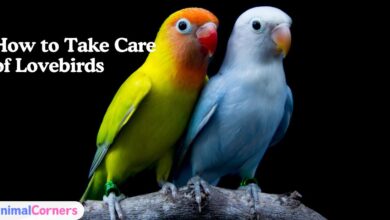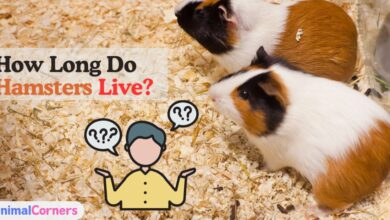Black Chinchilla | Interesting Facts, Cost, Behaviour and More
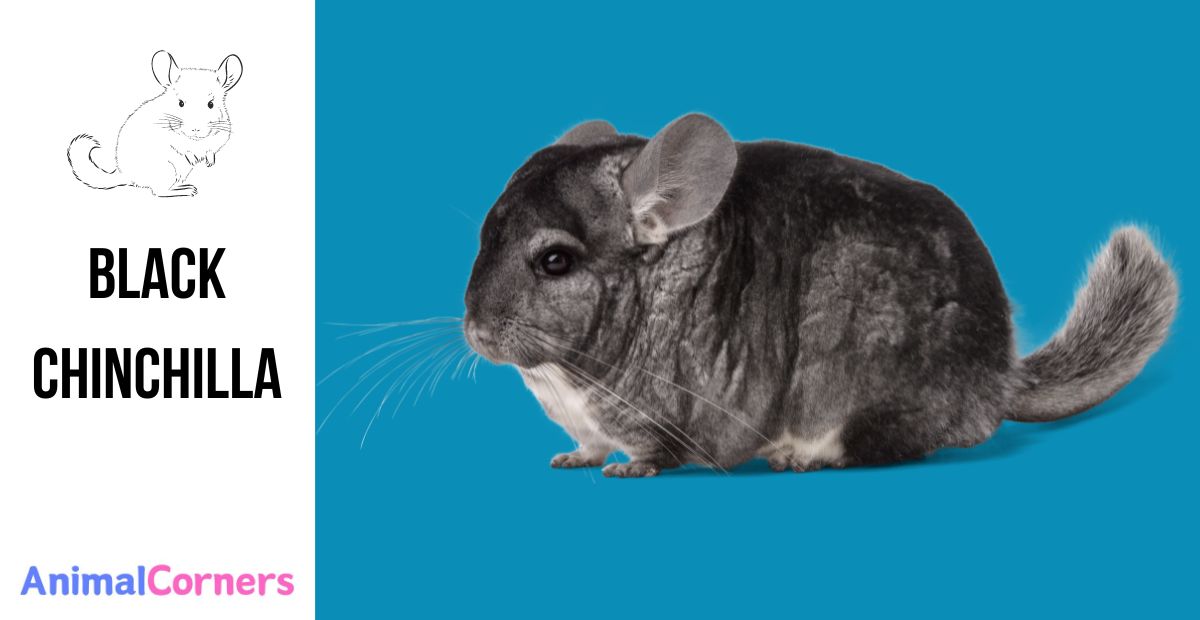
The black chinchilla is an exclusive variant distinguished by its prominent, bottomless black fur. This rare pattern results from exact genetic traits, making them highly hunted by enthusiasts and breeders. Black chinchillas share the same friendly and social behaviour as their more common complements but stand out due to their individual arrival.
This post will delve into numerous features of the captivating Black Chinchilla. You will learn intriguing facts about these unique individuals, including their genetic makeup and striking appearance. Through this complete guide, you’ll be well-armed with the knowledge you want to gain and possibly care for a black chinchilla.
What is a Black Chinchilla
Chinchillas are minor, nocturnal rodents natural to the Andes Mountains in South America. They are known for their incredibly soft and solid fur, which offers outstanding defence against the cold. These social animals are classically grey but can originate in diverse colours due to selective education.
Physical Characteristics of Black Chinchilla

Description of Fur Texture and Color
The fur of a black chinchilla is exceptionally soft and thick. This surface is due to many fine hairs filled closely together, which delivers outstanding wadding. The deep, rich black fur is quite arresting and associated with the more common grey or other colours.
Specifics of Black Fur Pigmentation
Black fur pigmentation in chinchillas occurs due to confident genetic characteristics. Unlike the distinctive grey chinchillas, black chinchillas are more attentive to melanin in their fur, resulting in dark ruddiness. This exact pigmentation is often called “ebony” in the context of chinchilla breeding.
Comparison with Other Chinchilla Variants
When associated with other chinchilla colour variants, black chinchillas attitude out due to their exclusive and rare black fur. While standard grey chinchillas are common, variants like white, beige, and assortment exist but are less regularly realized. Among these, the black chinchilla is primarily eye-catching and infrequent.
Size and Weight
Black chinchillas share similar size and heaviness features with other chinchilla alternatives. On average, they weigh between 1 and 1.5 pounds and are about 9 to 14 inches in length, exclusive of their tail.
Average Dimensions for a Black Chinchilla
The standard black chinchilla will classically quantity around 10 to 12 inches in length, with a tail addition of an extra 3 to 6 inches. The weight differs but typically remains within the 1 to 1.5-pound range.
Differences from Other Chinchilla Types
The prime difference between black chinchillas and other kinds is their fur colour. Socially and materially, black chinchillas are very similar to different variants. However, their exclusive fur colour occasionally makes them more necessary to pet owners and breeders.
Behaviour and Lifestyle
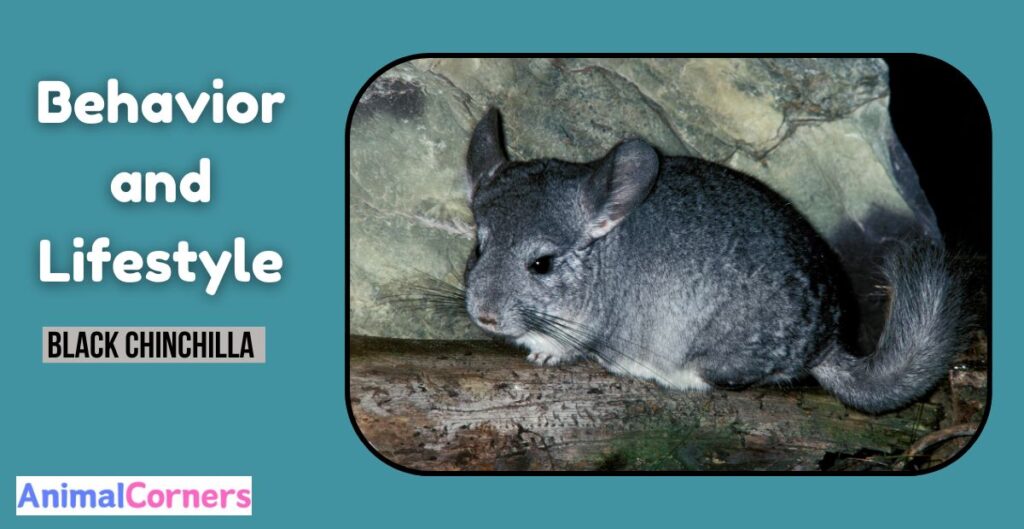
Social Structure
Black chinchillas are social animals and flourish in environments where they can relate with others. In the wild, chinchillas live in colonies, which helps them defend each other from predators and preserve social bonds. As pets, they enjoy the business of other chinchillas and can often be seen preparing and living with each other.
Group Dynamics and Solitary Behaviors
Within their social collections, chinchillas establish a hierarchy. They connect through various vocalizations and body language to keep this construction. While friendly, some chinchillas can also reveal lonely behaviours, especially if they feel worried or threatened. It’s essential to monitor their connections to confirm unity within the group.
Dietary Habits
A chinchilla’s diet mainly consists of hay, which delivers the fibre for its intestinal health. It also eats profitable chinchilla pellets that are expressed to meet its nutritious needs. Fresh vegetables and fruits can be given as infrequent treats, but they should be separate from the diet as they can cause digestive problems.
Preferred Foods and Foraging Behavior
Chinchillas select high-fibre foods like hay and are also identified as enjoying chewing on safe wooden blocks and twigs to preserve their dental health. Chinchillas are fodder for grasses, leaves, and twigs in the wild. Providing a variety of safe items to chew on in captivity helps mimic this natural behaviour and keeps them mentally stimulated.
Activity Patterns
Chinchillas are highly active and curious animals. They require ample space to explore and exercise. Providing dolls, passageways, and wheels can help keep them involved and physically fit.
Nocturnal vs. Diurnal Activities
Chinchillas are nocturnal, but they are most active throughout the night. During the day, they classically rest and sleep, favouring quiet and dimly lit situations. Their natural action designs can help pet holders create a more appropriate and relaxed living environment for their chinchillas.
Interesting Facts about Black Chinchillas
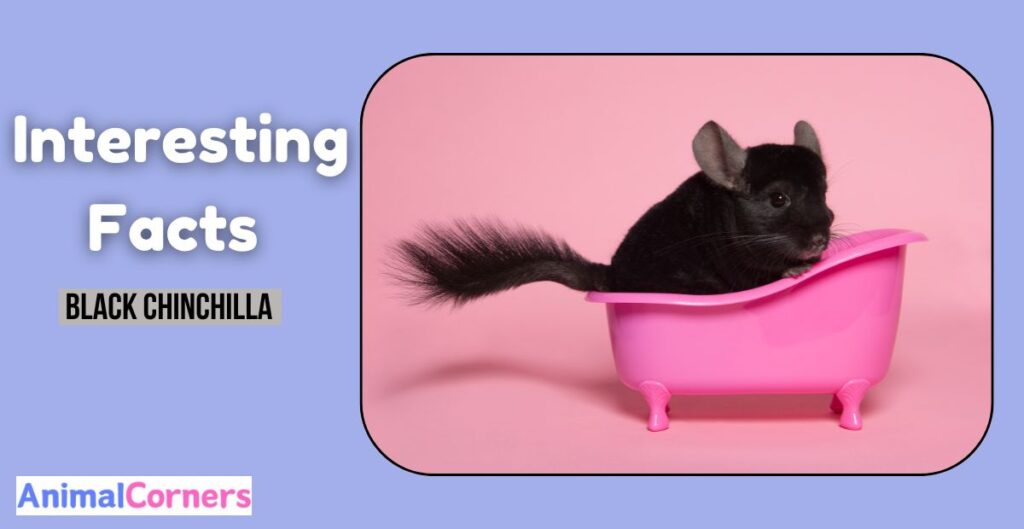
Black chinchillas are fascinating creatures with several unique characteristics. Here are some interesting facts about them:
Unique Fur Density
Black chinchillas have some of the densest fur among mammals. Each hair follicle can have more than 50 individual hairs, which makes their fur incredibly soft and insulating.
Genetic Rarity
Chinchillas’ black colour is due to a recessive gene. This means both parents must carry this gene for a black chinchilla to be born, making them quite rare.
Long Lifespan
Chinchillas, including black ones, can live for a long time compared to other small pets. With proper care, they can live up to 15-20 years.
Dust Baths
Black chinchillas take dust baths instead of washing with water to stay clean. They roll around in special chinchilla dust, which helps remove oils and dirt from their fur.
Large Ears
Black chinchillas have large ears that help them regulate their body temperature. The ears are especially good at keeping them cool by dissipating heat.
Chewing Habits
Chinchillas, including the black variety, are avid chewers. This habit helps them keep their constantly growing teeth at a manageable length. Providing safe items to chew on is essential for their dental health.
High Jumpers
Despite their small size, black chinchillas are brilliant jumpers. They can leap up to 6 feet in a single bound, which helps them leak from marauders in the wild.
Social Creatures
Black chinchillas are very social and thrive in groups. They connect with each other using language and body language.
Nocturnal Lifestyle
These animals are nighttime, meaning they are generally dynamic around evening time. During the day, they like to rest in a calm, faintly lit climate.
Playful Personalities
Black chinchillas are known for their playful and probing nature. They enjoy discovering their surroundings and playing with many toys and tunnels.
These exciting facts highlight black chinchillas’ unique qualities and behaviours, making them charming subjects for pet owners and animal fans.
Cost of a Black Chinchilla
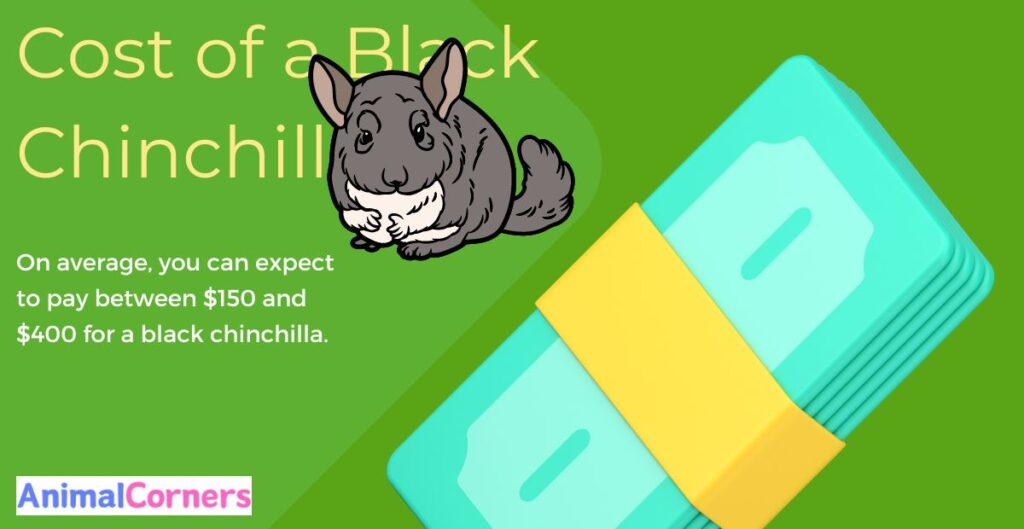
The expense of a dark chinchilla can shift given a few variables, like age, family, and where you get it from. You can pay between $150 and $400 for a dark chinchilla. Costs might be higher for chinchillas with uncommon colourations or explicit rearing foundations. Likewise, it is fundamental to calculate the expenses of basic supplies like an enclosure, food, bedding, and toys, which can add to the general cost of claiming a chinchilla. Embracing from a sanctuary or salvage might offer more sensible choices.
Is Black Chinchilla a Good Pet?
Claiming a dark chinchilla can be a compensating experience. These creatures are known for their excellent and lively nature, making them brilliant mates. Their attractive dark fur is beautiful and delicate to the touch, which various animal people view as engaging.
Like other chinchillas, black chinchillas enjoy being social and may form strong bonds with their owners. However, they need specific care and a proper situation to thrive.
They need a spacious cage, a balanced diet, and regular application and mental stimulation opportunities. Because they are nighttime, they may be more active at night, which is something to reflect if you prefer a quiet evening.
Suppose you are ready to meet their needs and enjoy caring for small, active pets. In that case, a black chinchilla can make an excellent addition to your family.
What is the Rarest Chinchilla Color?
Among the diverse array of chinchilla color variants, the rarest is widely considered to be the “Royal Persian Angora.” This variant features very long fur and can appear in several colours. Still, its unique coat length and texture set it apart. Another rare colour is the “Sullivan Violet,” characterized by a lovely soft violet hue. Breeders and fans often covet these rare variations due to their distinctive arrival and scarcity. As a result, they are luxurious and challenging to find.
Common Health Issues and Preventive Measures
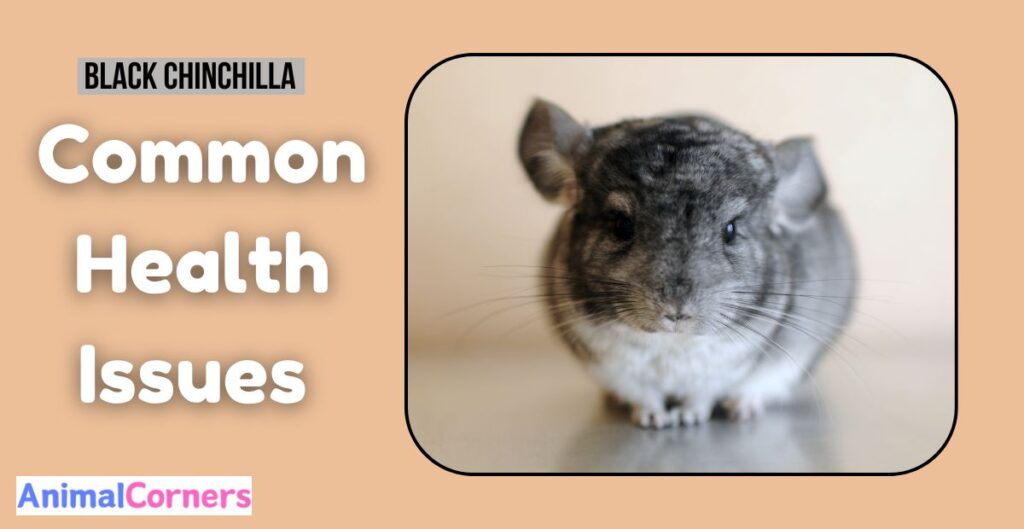
Black chinchillas are usually healthy pets but susceptible to specific health matters. Awareness of these mutual problems and taking preventive measures can help confirm your pet lives long and strong.
Dental Issues
Chinchillas have continuously growing teeth, which can lead to dental problems such as malocclusion if not appropriately managed. Providing safe, chewable items like wooden toys and hay helps wear down their teeth naturally. Regular veterinary check-ups can catch dental matters early.
Respiratory Infections
Unfortunate ventilation, dusty conditions, or unexpected temperature changes can cause respiratory diseases. To forestall this, keep their living region spotless and very much ventilated and keep a predictable, moderate temperature. Try to avoid putting their enclosure in drafty or soggy areas.
Gastrointestinal Problems
Gastrointestinal problems can result from a poor diet or unexpected changes in diet. Always provide a stable, fibre-rich diet, counting high-quality hay and pellets. Avoid giving them too many treats or foods high in sugar or fat.
Fur Issues
Black chinchillas’ dense fur can be prone to matting or fungal pollution if not cared for correctly. Regular dust baths help keep their fur fresh and free from oils. Confirm that the dust is precisely formulated for chinchillas to prevent respiratory complications.
Heat Stress
Chinchillas are sensitive to high temperatures and can suffer from heat stress or stroke. Keep their environment cool, ideally between 60-70°F (15-21°C). Avoid placing their cage in direct sunlight or near heat sources.
Ear Infections
Large ears help chinchillas regulate their body fever but can also be prone to infections. Watch for signs such as head tilting or scratching at the ears. Regular dusting and avoiding overly noisy situations can help prevent ear matters.
Eye Problems
Foreign particles or infections can cause eye problems in chinchillas. Screen for indications of redness, darkness, or release. Brief veterinary consideration is critical, assuming any of these side effects are noticed.
By being mindful of these shared health issues and implementing preventive measures, you can help confirm that your black chinchilla remains happy and healthy. Veterinary care and a well-maintained living environment also play vital roles in your pet’s general well-being.
Final Thoughts on the Unique Charm of the Black Chinchilla
The black chinchilla’s unique charm lies in its excellent mixture of playful character, striking entrance, and soft, velvety fur. These little creatures are not only fun to watch as they discover and play, but they also become respected friends for those who take the time to care for them. Their delightful looks and friendly nature make them a delight to have around, bringing joy to their owners. In addition, black chinchillas are comparatively low-keep pets once their specific needs are met, making them ideal for devoted pet lovers. Whether you are drawn to their captivating black coat or lively antics, black chinchillas offer a special joy that can brighten any home.



